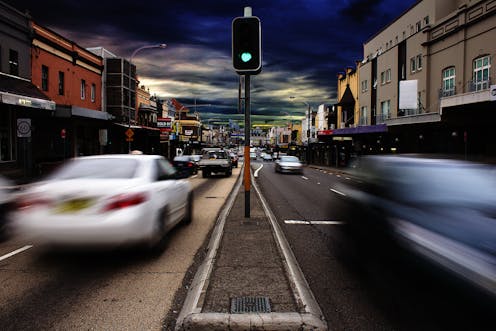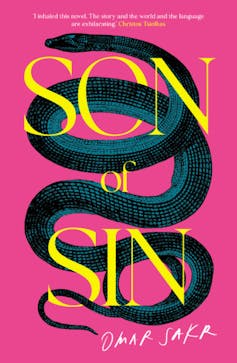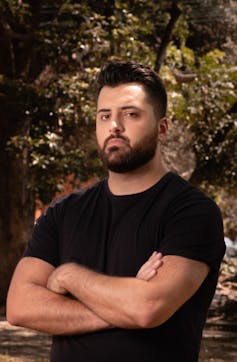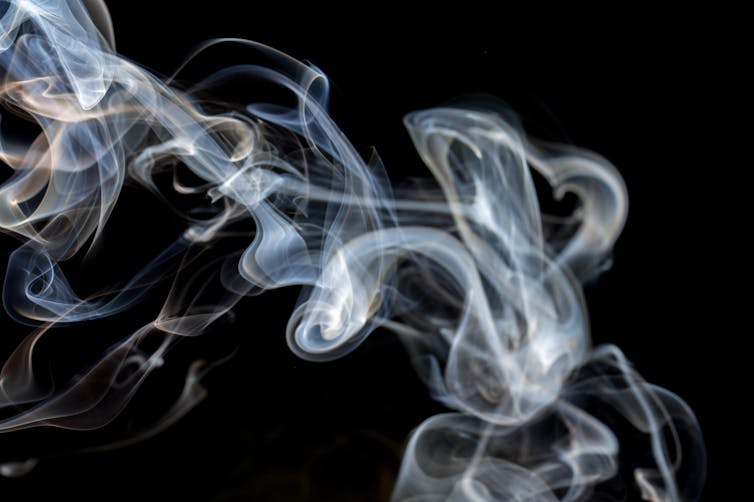Source: The Conversation (Au and NZ) – By Cherine Fahd, Associate Professor, School of Design, University of Technology Sydney

Son of Sin, the debut novel from writer and poet Omar Sakr, tells the tale of Jamal Smith, a young Arab-Australian growing up in Western Sydney. Sakr’s two poetry collections, These Wild Houses (2017) and The Lost Arabs (2019), were widely admired, and the latter won the 2020 Prime Minister’s Literary Award.
Review: Son of Sin – Omar Sakr (Affirm)
Jamal sexually yearns for men, but hides his bisexuality. The asphyxiating expectations of his community, where same-sex desire is forbidden, make him fear real and imagined dangers. He dreads punishment, not only from the supernatural beings known in Arabic as djinn, but from his emotionally explosive and conservative family.

Jamal’s forbidden desires are explored against the backdrop of the Islamic holy month, Ramadan, and its spiritual quest: “No food, no water, no cursing, no violence, no sex, no masturbation.”
His family compete at fasting. No one wants to be the first to succumb to temptation: “to break your fast was to be the split spoiling the family ceramic.” Jamal tries not masturbate or fantasise about sex or food. He doesn’t want to be haunted by the djinn and he doesn’t want to be disowned for being a “faggot”.
Acceptance and abandonment
The tension sets the stage for a darkly comic family saga. Jamal, who desires acceptance, has been abandoned by both his parents. Largely brought up by his Aunty Rania, he has shared a room with his cousins for much of his young life.
His father, Cevdat Khan, a compulsive liar and shonky businessman, is “always going back to Turkey, unable to stay still, unable to hold onto any of his children”. Jamal’s mother, Hala Smith, once a “great beauty”, is always getting high with “her junkie mates”, jaded from a previous forced and violent marriage.
She’s also violent, beating Jamal and his handsome half-brother Moses, who stay clear of her as a result. But Jamal can’t escape her. She has no money and nowhere to live when she arrives “wearing a bumbag with S-L-U-T spelled out in diamantes”, asking Jamal if she can stay at his share house in Stanmore.
The on-again-off-again relationship between Jamal and his mother, and Jamal’s unspoken fear that she had been raped by her own father, are central to the story’s tension.
Challenging macho myths
Sakr has created Jamal to challenge the macho heterosexual myths that pervade Arab-Australian male culture. Son of Sin explores Jamal’s rich inner world: his imagination, his hopes and his hopelessness.

Jamal is someone who “would die for his sensations”. When he finally realises himself sexually, he acts out his fantasies in sudden, pressurised, erotically clumsy encounters with mostly Arab men. “He was a faggot, oh God he was a fag, and he fucking loved it.” While Jamal punishes himself for being a “fuck-up”, enjoys “the lancing pain of anal sex”, escapes into “sweaty underarms” and revels in the smell of “hairy funk”.
But Son of Sin is not all about sex. You don’t need to be an Arab-Australian to recognise the racism, Islamophobia and homophobia that Jamal experiences at the hands of his family, the “cops”, and a society that is awash in post 9/11 fear, white supremacy, and the hatred that culminated in the Cronulla Riots of 2005.
Read more:
Friday essay: a response to the Cronulla riots, ten years on
Existing between two places
The sociopolitical stresses of post-9/11 Western Sydney are depicted alongside the invisible stresses of the migrant experience. The novel captures the subtle tensions that come with existing between two places, two languages, two cultures, two parents.
Comically, in the opening pages of the book, Jamal’s mother drags him to court to change his surname from Khan to Smith. (I laughed, reminded of how much I dreamt my father would change our surname from Fahd to Ford.)
Sex and violence aside, Jamal’s tenderness for both his parents, and his capacity to forgive them, are heartbreaking. While he describes the precarious lives of his friends and cousins, the criminality and violence of his family, he’s still affectionate towards them, and needs their approval and love. Despite his yearning to escape his family’s troubled life, he never judges them.
A brief stint at university sees him move into Sydney’s inner west. Jamal notes the socioeconomic divide between his Western Sydney life and his new friends from Anglo and Jewish families, who live in more prosperous suburbs. His flatmate Dan has:
wealthy parents. He had no HECS debt, and a mansion he could return to whenever he tired of his pretend independence.
Hypermasculine men and gossiping women
The complexity and warmth of Jamal’s character permeates the book, through his interactions with its cast of hypermasculine men and their gossiping women. The men in Jamal’s family were expected to provide, and to be tough and strong, sexually charged and in charge.
Given how few Arab-Australian voices there are in Australian literature, it’s inevitable that Son of Sin will be compared with Michael Mohammed Ahmad’s The Lebs (2018). Both writers are part of a groundswell of Arab Australian writers representing the lives of Arabic Australian men on their own terms, from their own perspectives.
Read more:
What does a ‘Leb’ look like?
And there are similarities. An artistic young man must negotiate masculine expectations amid poverty, marginalisation, racism, homophobia and sexism. For example, Jamal is sniffed out as “gay” because of his love of books and reading.
When Jamal had started carrying books everywhere, he got his fair share of shit, but it lessened as he grew taller and his beard came in.
But for Jamal, “books were his shield against the darkness of the world”. Son of Sin is woven with comic details that will resonate with those born into migrant families. “Everyone expected greatness from him because he read books.” While mocked by his peers for reading, his “barely literate family” see the promise of social mobility and an end to their poverty.
Lebanese vernacular is splashed throughout. As an Arab-Australian reader, seeing my language on the pages of an Australian novel was both strangely comforting and disconcerting: I’m not used to seeing it represented in the context of Australian literature.
There’s a beautiful sequence when Jamal escapes his family and the western suburbs for Turkey, saying he wants to meet his father there. Really, though, it’s an excuse to travel, after Canada denies him a visa.
In Turkey, he finally gets to know his estranged father and his kindhearted uncle, Mehmet Khan. He falls in love with the local barber’s son, Kassem, who breaks his heart. Jamal returns to Sydney haunted by dreams of suicide.

www.shutterstock.com
Bisexuality ‘offers hope of redemption’
Back home, there is an amusing email exchange after Jamal reveals himself to his father, Cevdat, as bisexual. Cevdat is convinced that being “bi” offers hope of redemption: “As long as you are not a homosexual … that means you can overcome this.” Bisexuality seems less shameful, in his view, than exclusively wanting men.
As a reader, I dreaded Jamal being killed if he came out – or worse, was found out. In one scene, Jamal’s half-brother Moses, through a bathroom window, spots him having anal sex with a moisturiser bottle. Unwittingly, Jamal survives. “The Smiths were a family of unspoken secrets.” Being queer is one thing, publicly acknowledging it is another.
Sakr’s novel, like his poetry, brings attention to the lives of queer Arab-Australian boys and men. Like the playwright James Elazzi, Sakr creates queer stories addressing the taboo of same-sex desire in the cultural context of Western Sydney. He is funny and unapologetic, creating epic, stunningly dirty narratives that should appeal to a new generation of Australians.
A group of academic authors recently asked, “what might a crowdsourced queer-friendly English curriculum look like in Australia?”
Son of Sin would be one book at the top of my list for senior students.
Read more:
Pages and prejudice: how queer texts could fight homophobia in Australian schools
![]()
Cherine Fahd does not work for, consult, own shares in or receive funding from any company or organization that would benefit from this article, and has disclosed no relevant affiliations beyond their academic appointment.
– ref. Omar Sakr’s ‘epic, stunningly dirty’ debut novel challenges macho heterosexual myths of Arab-Australian culture – https://theconversation.com/omar-sakrs-epic-stunningly-dirty-debut-novel-challenges-macho-heterosexual-myths-of-arab-australian-culture-175640




